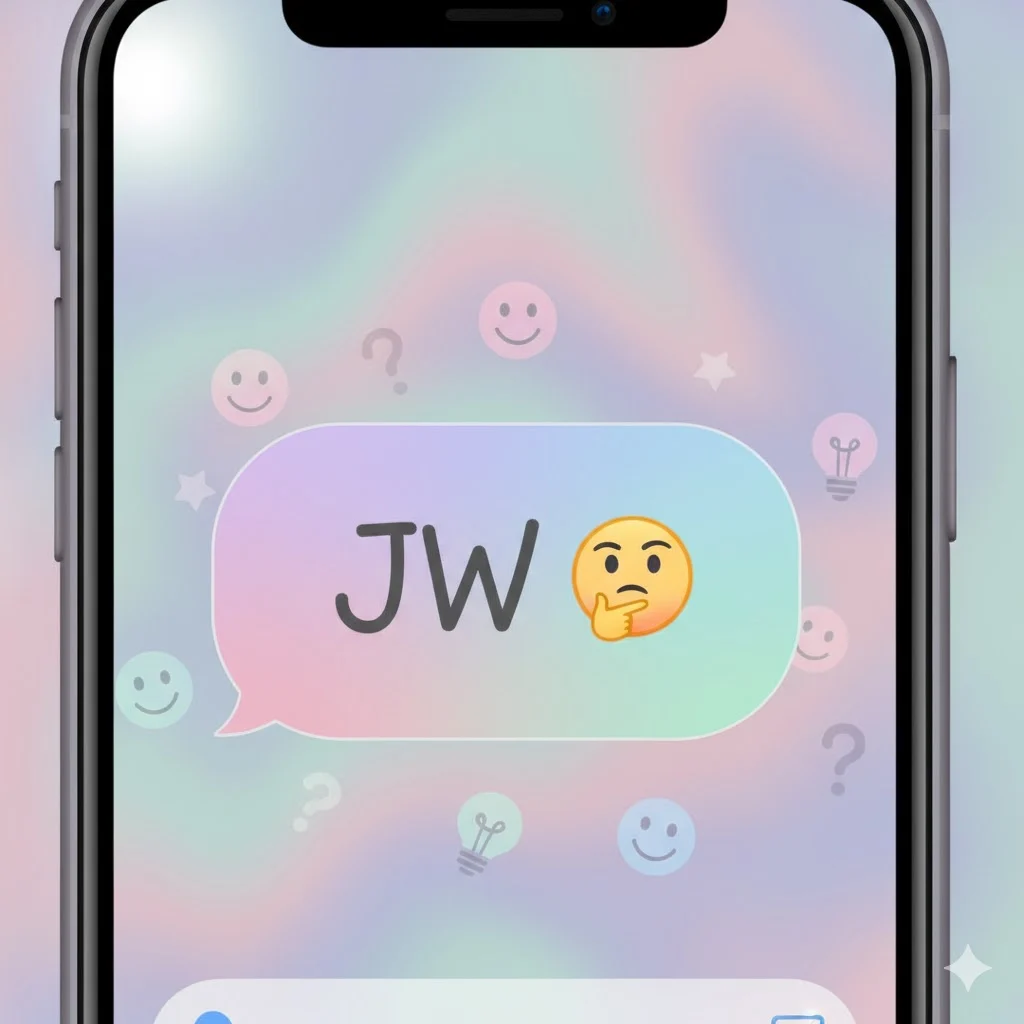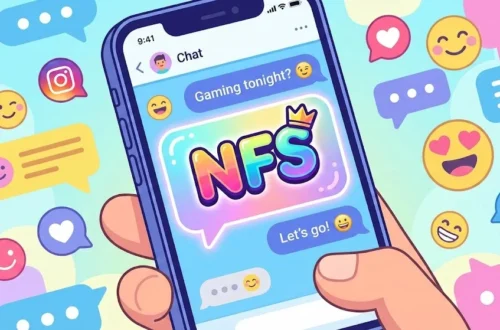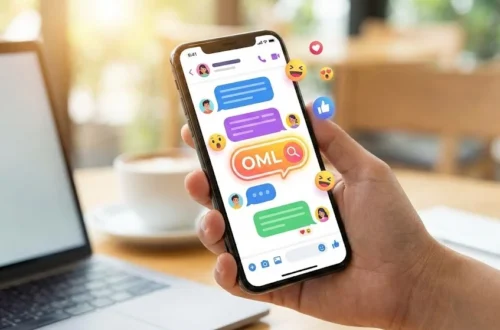Hey there! 👋 Have you ever opened a message that said “JW” at the end and thought, “Wait… what’s that supposed to mean?” Don’t worry — you’re definitely not alone.
If you love texting, chatting on social media, or gaming with friends, you’ve probably seen abbreviations like LOL, BRB, or SMH. But JW is a little different — it’s not about laughing or rolling your eyes. It’s actually a simple, friendly way to start a conversation.
This article is for you — the texter, social media user, or digital communicator who wants to understand modern abbreviations and use them naturally. We’ll break down what JW means, how to use it, when it’s appropriate, and what to say when someone sends it to you. By the end, you’ll be ready to recognize it instantly — and maybe even use it yourself.
Definition & Meaning
So, what does JW mean in text?
JW stands for “Just Wondering.”
It’s a casual abbreviation people use when they’re curious about something or want to ask a question without sounding too direct.
It helps soften the tone of a message — making your curiosity feel friendly instead of pushy.
Examples in Conversation
Emma: “Hey, did you finish the project?”
Jake: “Not yet — JW if we’re submitting it today or tomorrow?”
Here, JW means “Just Wondering.” Jake is being polite and casual.
Sophie: “Do you still talk to Alex?”
Liam: “Yeah, sometimes — JW why?”
Again, JW adds a softer, curious tone. Without it, the same message could sound suspicious or nosy.
So in short:
JW = Just Wondering = Curious, not confrontational
Background & History
The abbreviation JW came from the rise of text messaging and instant chat in the early 2000s.
As texting became faster and more casual, people started shortening phrases like “Just Wondering,” “By The Way,” and “In My Opinion.” That’s how JW, BTW, and IMO became popular in digital communication.
The goal? Typing less, saying more.
“JW” spread quickly across texting platforms, instant messengers like MSN and AIM, and later social apps like Facebook, Twitter, and Instagram.
Today, it’s used everywhere — from casual chats to professional DMs — because it’s friendly, polite, and easy to understand.
Unlike many slang abbreviations, JW doesn’t carry any negative tone or hidden meaning. It’s straightforward, simple, and respectful.
Usage in Various Contexts
You’ll find JW used across all kinds of online spaces. Here’s how it works in different settings 👇
1. Text Messages
Friend A: “What time are you heading out?”
Friend B: “JW if we should go early to grab good seats.”
Here, it’s polite curiosity — not pressure.
2. Social Media
“JW, does anyone know if the store’s open on Sundays?”
“JW, where’d you get that outfit? Looks amazing!”
It’s often used in comments, captions, or posts when someone wants info without sounding demanding.
3. Gaming Chats
Player 1: “JW if you’re joining the next round?”
Player 2: “Yeah, gimme five minutes.”
In gaming, it keeps the tone light and casual among teammates.
4. Work or School Chats
“JW if we’re still on for the meeting tomorrow?”
“JW, do you want me to send that file now or later?”
It’s polite and professional enough for workplace texts or group projects — as long as you’re in a casual channel like Slack or WhatsApp.
Common Misconceptions & Clarifications
Because JW looks simple, some people misinterpret it. Let’s fix that 👇
❌ Misconception 1: JW Means “Jehovah’s Witness”
In other contexts — like religion — JW can stand for “Jehovah’s Witness.”
But in texting or online chats, it almost always means “Just Wondering.”
❌ Misconception 2: JW Sounds Suspicious
Nope. JW is meant to reduce tension, not create it.
Without it, a message like “Why did you go there?” might sound judgmental.
With it — “JW why you went there?” — it feels light and friendly.
✅ Clarification: Tone Matters
The way you say it (and who you’re texting) decides how it’s received.
Used with emojis or polite language, it always feels warm.
“JW 😊 did you like the movie?” feels kind.
“JW.” alone might seem abrupt.
So, balance is key.
Similar Terms & Alternatives
Here are some other short forms that people use in a similar way 👇
| Term / Slang | Meaning | Tone | When to Use |
|---|---|---|---|
| BTW | By The Way | Polite / casual | Adding a new thought |
| IDK | I Don’t Know | Neutral | Showing uncertainty |
| TBH | To Be Honest | Candid / open | Sharing opinion |
| NVM | Never Mind | Neutral | Withdrawing a question |
| ICYMI | In Case You Missed It | Informative | Sharing updates |
| IMO | In My Opinion | Polite | Sharing views |
If JW feels too informal, you can replace it with:
- “I was just curious…”
- “I wanted to ask…”
- “I’m wondering if…”
Those sound more professional while keeping your tone friendly.
How to Respond to JW
If someone sends you JW, how should you reply? It depends on what they’re wondering about.
1. Casual / Friendly
Friend: “JW, what’s your plan this weekend?”
You: “Not much, maybe Netflix and snacks 😎”
2. Curious or Neutral
Coworker: “JW, are you joining the team lunch?”
You: “Yeah, I’ll be there at noon.”
3. Flirty / Playful
Someone: “JW, who’s your crush lately?”
You: “Wouldn’t you like to know? 😉”
4. Professional
Manager: “JW if you finished the report.”
You: “Almost done — I’ll send it shortly.”
5. Private / Reserved
If you don’t want to share, you can reply politely:
“I’d rather not say, but thanks for asking 😊”
It’s always okay to set boundaries.
Regional or Cultural Differences
Unlike slang terms that depend on region, JW is understood globally.
Because it’s written in English and doesn’t rely on cultural references, people in the U.S., U.K., Canada, India, and beyond all use it in digital chats.
However, in bilingual or Spanish-speaking communities, “JW” might sometimes be confused with other local abbreviations. So, if you think the person might not know it, just spell it out once — “(Just Wondering)” — and they’ll get it next time.
Comparison with Similar Terms
Here’s a quick comparison table 👇
| Expression | Meaning | Tone | Best Use |
|---|---|---|---|
| JW | Just Wondering | Polite / curious | Asking softly |
| IDK | I Don’t Know | Neutral | Uncertain response |
| BTW | By The Way | Informal / polite | Adding info |
| NVM | Never Mind | Neutral | Canceling question |
| ICYMI | In Case You Missed It | Informative | Sharing updates |
| TBH | To Be Honest | Honest / open | Sharing opinions |
Think of JW as your “soft question starter.” It opens doors without sounding demanding.
Usage in Online Communities & Dating Apps
JW is super common in social media and dating apps, where tone matters a lot.
On Instagram
“JW, what filter did you use? 😍”
On Twitter / X
“JW if anyone else cried at that ending 😭”
Tinder or Bumble
“JW, what’s your go-to coffee order?”
“JW, are you into beach trips or city breaks?”
It’s polite, curious, and makes conversations feel natural — perfect for making a friendly first impression.
Hidden or Offensive Meanings
Good news — JW has no hidden or offensive meanings in texting.
The only confusion comes when people mix it up with Jehovah’s Witness, but context clears that up quickly.
If you ever want to avoid confusion, just write “just wondering” the first time, especially in professional or formal chats.
Suitability for Professional Communication
Unlike most slang, JW can work in semi-professional settings — as long as you’re texting casually with coworkers or clients you know well.
Still, in very formal emails or documents, it’s better to write the full phrase:
✅ “I was just wondering if you received my message.”
❌ “JW if you got my message.”
So — use it freely in chats and DMs, but spell it out in business communication.
FAQs
1. What does JW mean in text?
It means “Just Wondering.”
2. Is JW rude or sarcastic?
No — it’s polite and friendly when used with the right tone.
3. Does JW mean something else?
Outside texting, it can mean “Jehovah’s Witness,” but not in chat contexts.
4. Can I use JW in work messages?
Yes, in informal chats. In emails, spell it out.
5. What’s the difference between JW and BTW?
JW asks a question. BTW adds a new topic.
6. How do I reply to JW?
Answer the question directly — it’s just friendly curiosity.
7. Is JW formal or casual?
Casual to semi-formal, depending on your tone.
Conclusion
To wrap it up JW simply means “Just Wondering.” It’s a quick, friendly way to ask questions or express curiosity without sounding demanding.
It’s perfect for texts, DMs, social media, and light professional chats.
Just remember: tone matters. Add an emoji or polite phrase if you want it to feel extra friendly.
Now that you know what JW means, you’ll recognize it instantly and you can use it to make your digital communication sound natural, polite, and modern.
Discover More Related Articles:-
- OpenAI Stock: Complete Guide to Investing in the AI Giant
- Doublelist Guide 2026: How It Works, Safety Tips & Free Listings
- Erome Explained: Safety, Legality, Risks, and Safer Alternatives






